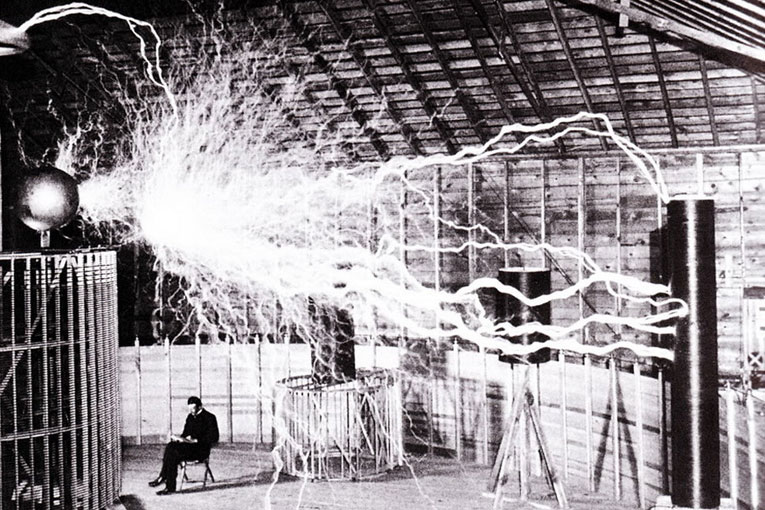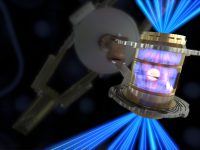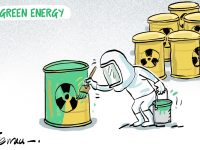
 Imatge de domini públic Imatge de domini públicNikola Tesla in his laboratory (Colorado Springs) in 1899 next to an operating Tesla coil. Picture taken by Dickenson V. Alley. |
||
|
Within the frame of Orxata Sound System’s political activism there is also place —of course— for science. A clear example of this can be found in their second album, 2.0 (self-produced, 2011), which includes a tribute song to Nikola Tesla, a figure that has increased its value in recent years thanks to the Internet. «It was a name that we had heard lately several times because he has become a kind of pop icon, but, what made us become more interested in a more political way was finding that some independent research groups are working on free energy» said one of the band’s members. Tesla —the song—, reviews the theoretical legacy left by the Croatian physicist and other scientists traditionally branded as heterodox. Over an insistent electronic music base, some other controversial figures of the history of science are also mentioned in the song. Tesla —pioneer in formulating a theory on free energy—, Feinberg, Boyer, Dirac or Mallowe believed that there are sources of unlimited energy, a theory rejected by the energy industry. They approach anti-gravitational energy from different perspectives, among scientific postulates close to quantum physic as well as other areas related to mysticism or the Zen philosophy. All of these factors, together with other political and economic aspects, have resulted in many stories that indiscriminately mix all areas. Orxata’s song also mentions the Joe cell (a device that is allegedly able to access the energy contained in the quantum vacuum) and the Majestic 12, which, according to some theories, is a secret American committee that intends to silence unlimited energy research. In any case, the lyrics of the song barely mention these aspects, and focus on Tesla’s challenge on centralised energy, a brave action that doomed him to poverty. «The song intended to remember a very important character for 20th and 21st century science and technology, who was silenced for a long time due to different reasons. We wanted to pay homage and raise the people’s interest in this Croatian genius». And, somehow, they have fulfilled their goal. They claim that «from time to time we get a tweet from someone that thinks of him while taking a physics exam». |
«Tesla —the song—, reviews the theoretical legacy left by the Croatian physicist and other scientists traditionally branded as heterodox»
«The lyrics focus on Tesla’s challenge on centralised energy, a brave action that doomed him to poverty» |
|
 This mural shows the MSST movement (Satelliteless movement) ideology in Brazil. |
«The MSST proposed, from a poetical and revolutionary point of view, sending to space handmade satellites which were completely unrelated to any government or corporation» |
|
|
Science is politics That Orxata focused on someone like Nikola Tesla to write one of their songs is not sheer chance. Ideas of free and decentralised access to energy can be gathered from the scientists’ theories, which fit the band’s collectivist ideals. On other occasions they had focused on topics like ecology, the hacker culture or society’s overexposure to the media. «We obsessed with all those technologies that can potentially empower us. The Internet, free software, free hardware, ways to do P2P, an all that applied to basic stuff like energy, communication, health, food or work», they said. This spirit could be understood as a reinterpretation of the Zapatista motto «For everyone, everything» in Latin America, where autonomist ideals are widespread. Precisely, the band’s latest release, 3.0 (self-produced, 2012), pays special attention to the South American continent— regarding new sounds as well as the topics dealt with. The album includes Satèl·lits, (Satellites), a song that intends to give a voice to the MSST movement (Satelliteless movement), which is increasing its strength in countries like Brazil. The MSST proposed, from a poetical and revolutionary point of view, sending to space handmade satellites which were completely unrelated to any government or corporation, with the intention of «mapping, rethinking the current structures of technocracy and science and redirect them», according to the movement’s manifesto. The mixture between science and politics is what attracted the band: «it charges politically a branch of technology we had been led to believe was almost science fiction, when it is an everyday life resource, even if we are not aware of it». This fact reminds them that «very rarely can science be separated from politics. Knowledge is a common good, and administrating it is politics». The band chooses not to talk about the anti-science position some leftist groups take because they think that «science is not always a fraud, but you cannot say either that everything science is unable to prove is automatically a lie. There is a lot of ancestral knowledge that is disregarded because it is not scientific knowledge, but even so it works». The musicians admit the irrefutably important role science plays in our everyday life, but without linking it to the university and business spheres. They think experimenting at home or on the Internet, descentralising science and promoting creativity and collective empowerment is essential, just as the MSST movement claims. They express this idea by paraphrasing Joan Fuster: «it is very important fighting for this, because in science, just like in politics, if you don’t do it yourself, they will do it against you». To listenr: To read: Felip Pineda. Journalist. Valencia. |
«Ideas of free and decentralised access to energy can be gathered from the scientists’ theories, which fit the band’s collectivist ideals»
«The band thinks that experimenting at home or on the Internet, descentralising science and promoting creativity and collective empowerment is essential» |
|





